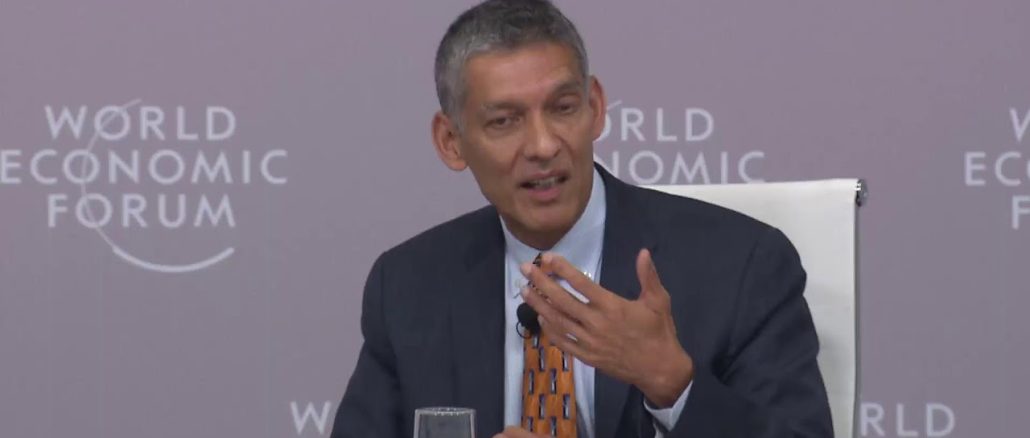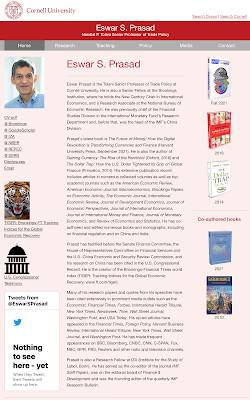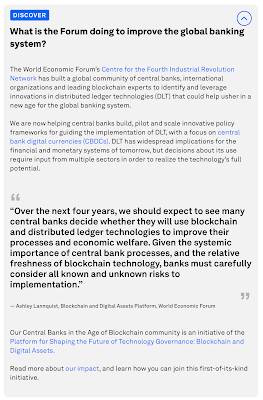
The World Economic Forum and Programmable Central Bank Digital Currencies – Our Dark Future
At the June 2023 World Economic Forum’s 14th Annual Meeting of the New Champions (aka Summer Davos) held in Tianjin, China, Cornell Professor Eswar Prasad addressed the crowd with a speech entitled “The Future of Money”. During his speech, Prasad shared his views on the coming world of finance and how we are at the “threshold of major disruption that will affect corporations, bankers, states and all of us”.
Let’s start with some background on Dr. Prasad to help us put his comments into perspective:
During the three day meeting, Eswar Prasad weighed in on the disappearance of physical currency as it is replaced by cryptocurrencies, particularly central bank digital currencies or CBDCs. Here is the video which shows all of Dr. Prasad’s speech entitled “The Future of Money” to the Summer Davos crowd of global insiders as it appears on the World Economic Forum’s YouTube channel noting that the WEF proclaims that “the transformation of money will fundamentally rewrite how ordinary people live“:
Here is the key quote which you can find at the 32 minute 41 second mark:
“If you think about the benefits of digital money, there are huge potential gains, it’s not just about digital forms of currency. You can have programability, you know, units of central bank currency with expiry dates . You could have, as I argue in my book, a potentially better some people might say a darker world – where the government decides that units of central bank money can be used to purchase some things, but not other things that it deems less desirable like say ammunition, or drugs, or pornography, or something of the sort, and that is very powerful in terms of the use of a CBDC, and I think also extremely dangerous to central banks because ultimately if you have different units of central bank digital money with different characteristics or if you use central bank money as a conduit for economic policies in a very targeted way, or, more broadly for social policies, that could really affect the integrity of central bank money and the integrity and the independence of central banks. So, there are wonderful notions of things that can be done with digital money but again I fear that technology could take us to a better place but equally has the potential to take us to a pretty dark place.”
At the very least, it’s ironic that these comments were delivered in China, a nation that has already implemented both a social credit scoring system and a central bank digital currency that are tied together. You’ll also note that Prasad does not particularly express concerns about the negative impact of CBDC programmability on individuals, rather, he is concerned about the impact of such policies on the central bank ecosystem itself.
In closing and as further background, the World Economic Forum is closely tied to the implementation of central bank digital currencies as shown here:
The transformation of money will fundamentally rewrite how ordinary people live. Imagine this for a moment. You are no longer in control of your money. You cannot spend it where and on what you wish to spend it. If you don’t spend your savings within a certain time limit, the government will take it away from you. If you express dissatisfaction with the government, you could have your “money” confiscated. And, as an added bonus, the authorities can track every expenditure that you make. While CBDCs are being sold to us as a means of increasing the speed of cross-border payments, in fact, such improvements affect almost none of the serf class. The downsides to the implementation of these central bank currencies vastly outweigh the benefits to the common man/woman.
Welcome to our dark, dystopian future where money is programmable. Our only hope is that governments and central bankers bungle the implementation of central bank digital currencies in the same fashion that they bungle politics and fiscal policies.



Be the first to comment